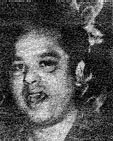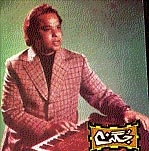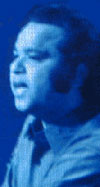|
|
||||||
|
The
wistful magic of Saleem Raza By Anis Shakur ‘Achievement is largely the product of steadily raising one’s levels of aspiration and expectation.’ The above maxim holds true
to the prominent Pakistani singer, Saleem Raza. Saleem Raza was born Noel Dias on July 7, 1932, in Amritsar, India. After
partition he migrated to Pakistan and settled in Lahore. He changed his name to Saleem Raza and made a name for himself as
a budding artist at Lahore Radio Station. At Lahore Radio Station Saleem Raza made friends with popular artist of the time,
Mohni Hameed. Both Saleem Raza and Mohni Hameed were often seen together for long periods of time. Additionally, Saleem Raza learned music from the famous music composers of those
days like M. Sadiq Ali, and Ustaad Aashiq Husain. Saleem Raza’s lucky break came in director Syed Ata ullah Hashmi’s
1955 film ‘Naukar.’ Saleem Raza lent his voice to the tragic score, ‘Taqdeer kay Malik deikh zara kya zulm
hai.’ Duet, Saleem Raza – Kausar Perveen. Thus, Saleem Raza debuted as a singer in 1955 in the film ‘Naukar.’ A music career beckoned and Saleem Raza rendered memorable songs in numerous hit
movies. Saleem Raza’s genius for recording sad songs and an abiding fervor to work
with distinguished luminaries helped him paint vivid portraits of Pakistani people in the harsh years after independence. Saleem Raza enthusiastically accepted Baba G.A. Chishti’s offer and sang
‘Haal apnay dil ka deewana.’ Duet, Saleem Raza-Kausar Perveen, composer, G.A. Chishti. The 1956 film, ‘Haqeeqat.’ A sense of quiet reverence pervades the song ‘Kya janay hum deewanay.’
The film ‘Afshan.’ I always think about whether something has a resolution and an edge. Well, Saleem
Raza’s voice had both. Example, ‘Hum bhi razi tum bhi razi.’ Duet, Saleem Raza-Kausar Perveen, the 1956
film ‘Choti Begum.’ Saleem Raza’s solos are immortal. But his romantic duets attained popularity
as well. Example, ‘Raat ho gaye jawan naghma.’ Duet, Saleem Raza- Kausar Perveen, the 1956 film ‘Sabira.’ Effective, admirable and wistful, Saleem Raza, by all accounts, completely captured
the public’s heart in the 1957 film ‘Daata.’ ‘Kar saari khatayain ma’af meri, teray dar pay
mein Aan gira.’ Pictured on Sudhir. Sabiha khanum-Sudhir played the lead in ‘Daata.’ Here is a classic song to be enjoyed for generations, ‘Malik teray jahan
kay.’ Duet, Saleem Raza-Kausar Perveen. The film ‘Daata.’ The public felt power in Saleem Raza’s melodious voice. He sang with a little
sadness, a certain wistfulness. Example, ‘Yaaro mujhay ma’af rakho mein nashay mein hoon.’ Pictured on Agha
Talish. Director, Jafar Malik’s 1957 super hit film ‘Saath Lakh.’ Music composer, Hasan Lateef, selected Saleem Raza for a masterpiece na’at,
and what a perfect choice! It started with a simple tune heard over the Radio. The melody echoed across an ocean and a continent,
traveling through the airwaves and straight to the hearts of millions of listeners. The lyrics were, ‘Yathrib kay wali,
saray Nabi teray dar kay sawali, Shah-e-Medina.’ Lyricist, Tanveer Naqui, director, Nazeer’s 1957 film ‘Noor-e-Islam’,
Here is a national song that conveys the loyalty of the Pakistanis, ‘Aao
baccho sair karayain tum ko Pakistan ki.’ Pictured on Santosh Kumar, the 1957 film ‘Baydaari.’ Another song of ‘Bay daari’ is a breathtaking art of composition as
well, ‘Hum lay Aa ye hain tufaan say kashti nikaal kay.’ The immense pain and pathos is part of what elevates Saleem Raza’s songs
so far above his competitors. Example, ‘Udaas hai dil, nazar pareshan.’ Composer, Safdar Husain, the 1957 film
‘Ishq-e-Laila.’ Saleem Raza’s career consistently went up from 1955 to 1970 as his songs
achieved enduring fame. Here is a romantic duet, ‘Chand takay chup chup kay.’ Duet, Saleem Raza- Zubeida Khanum.
Composer, Safdar Husain, the 1957 film ‘Ishq-e-Laila.’ Indeed, Saleem Raza was judiciously proud of his unpretentious superlative singing
voice. Example, ‘Mohabbat hui hai.’ Duet, Saleem Raza- Zubeida Khanum, the 1957 film, ‘Aas paas.’ Essentially, Saleem Raza’s forte were tragic songs. They lingered and remained
very much part of his life. In fact, that was a salutary trend then. Example, ‘Bay dard zamanay waloan nay kab dard
kisi ka jana hai.’ The 1957 film, Aas paas.’ Saleem Raza’s singing accomplishments were exemplary. What is more, the
lyrics are good enough to be devoured, memorized and insinuated into daily conversation. Here is an example, ‘Aye nazneen
tujh sa haseen, hum nay kaheen deikha naheen .’ The 1959 film ‘Shama.’ More often, though, Saleem Raza’s songs incite the pride and passion of
the music buffs. Example, ‘Ghari ghari yoon khari khari kya soach rahi hai tu.’ Composer, Rasheed Attray, the
1960 film, ‘Salma.’ Probably, the sad song that leaves the deepest and most indelible impression on
the moviegoers is ‘Zindigi mein aik pal bhi chayn Aaye na.’ Composer, Muslehuddin. Director Shaukat Hashmi’s
1960 film ‘Hum safar.’ No machine can replace the human spark: spirit, compassion, love and understanding.
This becomes all the more evident in Saleem Raza’s singing voice. Example, ‘Kaheen do dil jo mil jaatay, bigarta
kya zamanay ka.’ Duet, Saleem Raza- Naseem Begum. Director S.M. Yusuf’s 1960 mega hit film ‘Saheli.’ This song seems to echo Saleem Raza’s sentiments and the lyrics still nourish
our soul, ‘Magar aye haseena-e-nazneen, mujhay tujh say koi gila naheen.’ Composer, Muslehuddin, the 1960 film
‘Rah guzar.’ This song is a testament to Saleem Raza’s exceptional vocal timbre, ‘Shafaq
chehray pay leherati hai.’ Duet, Saleem Raza- Ayereen Perveen, in the 1961 film ‘Gul Bakawli.’ Saleem Raza, who is known for his probity, sang with distinction in the 1961 film
‘Gulfam.’ ‘Ye naaz, ye andaaz, ye jadu, ye adaein.’ Composer, Rasheed Attray. In all probability, Saleem Raza’s songs were as committed to his art as
his admirers would have expected them to be. Example, ‘Jhatak kay daman chali wo tan kay,’ in the 1961 film ‘Habu.’ Saleem Raza recorded songs in a string of hugely popular films. He was often chosen
to render tragic numbers. Example, ‘Bana kay mera nasheman, jala diya tu nay.’ In the 1961 film ‘Do Raastay.’ People were drawn in massive numbers to Saleem Raza’s resonant voice. Most
importantly, the public related those sad lyrics to their real life stories. Example, ‘Ye na thi hamari qismat keh wisaal-e-yaar
hota.’ Duet, Saleem Raza- Noor Jehan. Composer, Tasadduq Husain, in the 1961 film ‘Mirza Ghalib.’ This song is a moving tribute to Saleem Raza’s exceptional singing voice
– and the extraordinary power of music, ‘Zamana bohat he na meher baan hai.’ Composer, Rasheed Attray, in
the 1961 film ‘Farishta.’ Truth be told, Saleem Raza was a natural singer. But he also applied himself earnestly
as if it were a professional duty. Here is a romantic score, ‘Aik sapera ban kay lutera lutnay Aaya hai.’ Composer,
Manzoor Ashraf, in the 1961 film ‘Saperan.’ From day one, Saleem Raza managed his performance in a way to express a genuine,
intense feeling, and the effect was electrifying. Example, ‘Zindigi majboor hai.’ Director Diljeet Mirza’s
1962 film, ‘Barsaat mein.’ In Saleem Raza’s voice, the lyrics always seemed appropriate. Hence, he
was a rare commodity. Example, ‘Meray dil ki anjuman mein.’ Director Najam Naqui’s 1962 film ‘Qaidi.’
Composer, Rasheed Attray. Saleem Raza earned a place alongside the most prominent singers of the 1960s,
while his vocal in this song was pure magic, ‘Is sheher-e-kharbi mein gham-e-ishq kay maray.’ Composer, Rasheed
Attray, in the 1962 film, ‘Mauseqar.’ Saleem Raza channeled the energy with a rejuvenating life force all his own, singing
with affecting sincerity. Example, ‘Tum jug jug jeeyo Maha Raj ray hum teri nagaria mein Aaye.’ Composer, Rasheed
Attray, in the 1962 film ‘Mauseqar.’ Though the song below is gushing in its admiration, Saleem Raza’s mellifluous
voice upholds the sentimentality: ‘Jan-e-baharaan, rashk-e-chaman, ghuncha dahan, seemi badan, aye jaan-e-mun.’
Music, Inayat Husain, the 1962 film ‘Azra.’ Saleem Raza remained one of Pakistan’s most sought-after singers from 1955
to 1970, during which he lent his voice to a rich and rare assortment of songs such as the one below: ‘Tujh ko maloom naheen, tujh ko bhala kya maloom.’ Composer, Khalil
Ahmed, the 1962 film ‘Aanchal.’ Below is a song, whose strongest element is Saleem Raza’s unparalleled pathos,
which he efficiently instilled into the lyrics: ‘Aye dil kisi ki yaad mein hota hai bay qaraar kyon.’ Music, Inayat
Husain, the 1963 film ‘Ik tera sahara.’ Below is a perennial favorite of innumerable music buffs: ‘Aankhoan mein Aansuon ki rawani liye huay.’ Music, Inayat Husain,
the 1963 film ‘Ik tera sahara.’ Here is a romantic number, ‘Badaloan mein chup raha hai chand kyon.’
Duet, Saleem Raza- Naseem Begum, the film ‘Ik tera sahara.’ Saleem Raza always recorded songs with plenty of zest. The songs, on the other
hand, maintained a professional consistency. Below are two songs from the 1963 film ‘Mouj mela,’ composed by G.A.
Chishti. ‘Haltay ro datlay ro,’ singer, Saleem Raza. ‘Rabba ki soach kay banaya dil maa da,’ singer, Saleem Raza. Thanks to Saleem Raza’s superb rendition and the expressive soulful, Darpan’s
lip service to this song, ‘Jab say deikha hai tumhain, dil ka ajab Aalam hai.’ Composer, Sohail Rana, the 1963
film ‘Jab say deikha hai tumhain.’ Memories of ones childhood floods back as one listens to the familiar songs like
‘Aaj is shoakh ki tasweer bana lee mein nay.’ The 1963 film ‘Dhoop chaon.’ Saleem Raza captured the high spirits of one of Pakistan’s best-loved songs.
His is a glorious tale of warmth and gratitude. Here is another tragic score, ‘Shaam-e-gham phir.’ The 1963 film
‘Seema.’ Director, S.A. Bukhari. Here is a classic tragic number to be enjoyed for generations,’Bhool jaao
gey tum kar kay wada sanam tumhain dil diya to ye jana.’ The 1963 film ‘Seema.’ Saleem Raza’s song in the 1964 film ‘Chingari’, is remarkable
enough to be mentioned here, ‘Ik dil nay kahi, ik dil nay suni.’ Duet, Saleem Raza- Noor Jehan. Likewise, Saleem Raza had won over the hearts of his myriad of adorers on the song ‘Aaja paas meray gham ki lambi raat mein.’ The 1964 film ‘Chingari.’ Songs like this are still emblazoned in ones mind ‘Zindigi tujh ko
pukaray Aaa.’ The 1964 film ‘Chingari.’ Saleem Raza envisioned success and that is precisely he achieved within a short
period of time. Here is an example of his exceptional singing prowess, ‘Jaan keh kar jo bulaya to bura maaan gaye.’
The 1964 film ‘Maikhana.’ Few singers came close to the depth and influence of Saleem Raza’s voice.
Here is a qawwali which is vital , too, for its timeliness, ‘Na milta gar ye tauba ka sahara hum kahan jaatay.’
Saleem Raza, Muneer Husain and associates recorded it for the 1964 film ‘Tauba.’ This song demonstrates the power of universal love, ‘Husn ko chand, jawani
ko kanwal kehtay hain.’ Composer, Rasheed Attray, the 1966 film ‘Payal ki jhankar.’ This song will stand as a musical high point for quite a while, ‘Hum nay
to tumhain dil day he diya.’ Duet, Saleem Raza- Naseem Begum. Composer, Rasheed Attray, the film ‘Payal ki jhankar.’ It is hard to believe that Saleem Raza sang enough songs to keep us interested
fifty years later. But as it turns out, Saleem Raza still has a loyal following. Example, ‘Lay kay angrai mera pyar,’
Duet, Saleem Raza- Nighat Seema.’ The 1964 film ‘Head constable.’ In the annals of sad songs, Saleem Raza stands out. Example, ‘Na Aaye Aaj
bhi tum kya ye bay rukhi kam hai.’ Duet, Saleem Raza- Mala. Music, Inayat Husain, the 1967 film ‘Dewar bhabhi.’ Saleem Raza’s voice was sublime and glorious, as such it flourished in many
of the 1960s movies. Here are two examples: ‘Meri baahoan pay zulf teri.’ Duet, Saleem Raza- Noor Jehan, the film
‘Mehboob.’ ‘Tumhari qasam tum pay dil Aa gaya.’ Duet, Saleem Raza- Iqbal Bano,
the film ‘Naghma-e-dil.’ There is a cluster of distinctively Pakistani work in Saleem Raza’s voice.
Furthering his mission to deliver the best he had to offer. Below are two examples: ‘Raat bata aye unko meri.’ Duet, Saleem Raza- Mala, the film ‘Najma.’ ‘Ikhar Aao tumharay kaan.’ Duet, Saleem Raza- Mala, the film ‘Parda.’ Saleem Raza’s industriousness leads to one success after another. Example
‘Jhumay jhumay, jhumay.’ Duet, Saleem Raza- Kausar Perveen, the film’ Naya zamana.’ Saleem Raza won the Nigar Award for best singer in the film ‘Hum safar’
in 1960. Saleem Raza won the Musawwir Award in 1960. Saleem Raza won the screen light Award in 1962. Saleem Raza won the Nigar Award for best singer in the film ‘Seema’
in 1963. Pakistan Arts Council, Lahore, awarded Saleem Raza a Medal in recognition of his
relentless effort to promote quality music in 1966. Saleem Raza won the social services Award in 1968. Lamentably, Saleem Raza was in the grip of extremely serious financial crisis
in the 1970s. Fortunately, his wife, Maude, earned the livelihood and supported him. Saleem Raza migrated to Vancouver, Canada, in 1975, and established a music school.
For eight years, from 1975 to 1983, Saleem Raza taught music to numerous music lovers. All things bad and good must come to
an end. Bad luck, in 1983, Saleem Raza suffered from kidney malfunction, which took its toll on November 25, 1983. He was
fifty-one years of age. Today,
one hopes as one listens to Saleem Raza’s songs, that they will not vanish into the mist of memory. |
||||||
|

|


